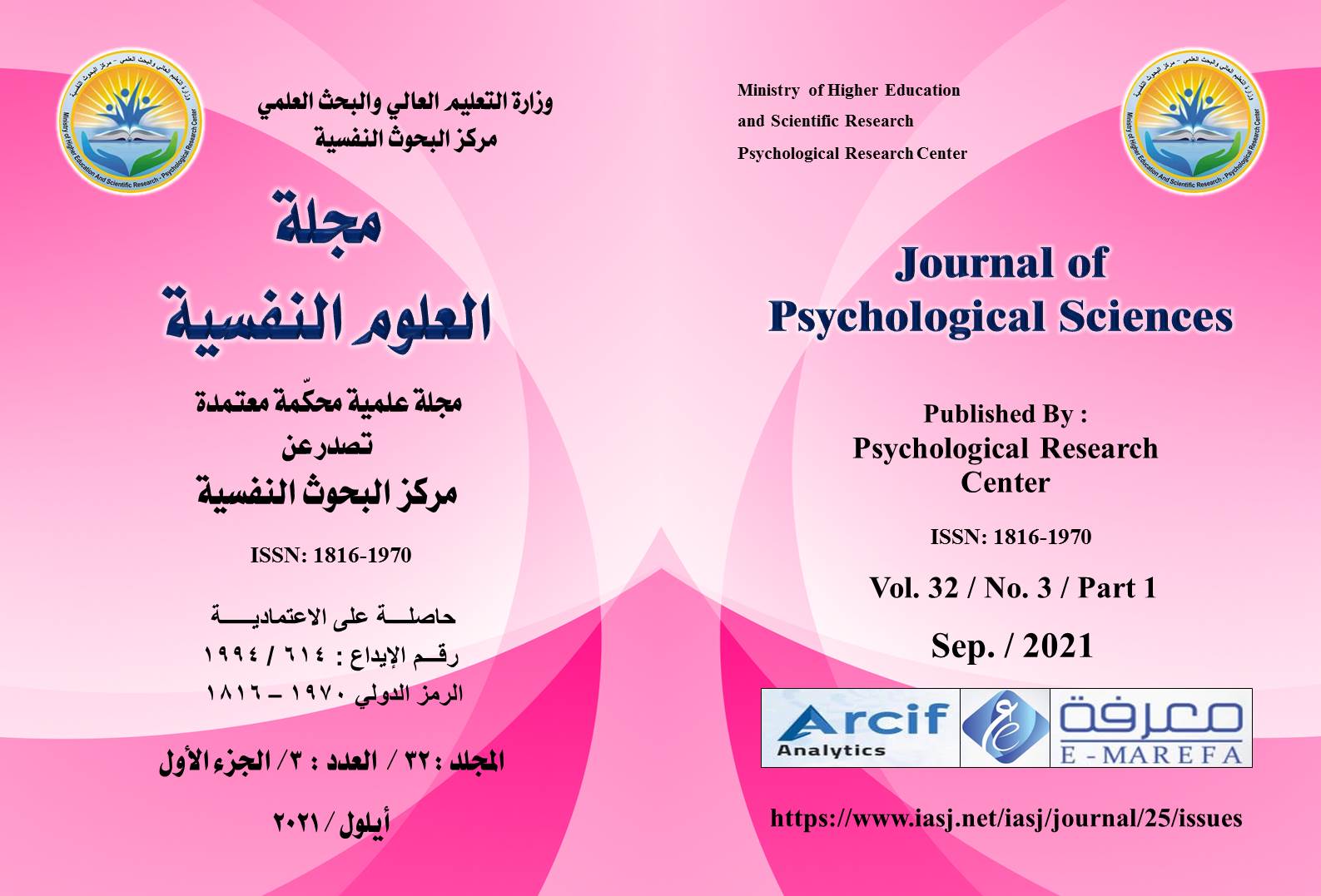Abstract
Abstract:
The purpose of the current study is to identify the level of Boredom proneness among Baghdad University students, and to reveal the differences in the level of boredom according to the gender variable (males - females), specialization (scientific - human), and the university stage (first - second - third - fourth). A random sample was selected consisting of (134) students(64 male, 70 female). and the sample included (89 the scientific specialization, 45 from the humanitarian specialization), and the university stage (19 first, 42 second, 41 third, and 32 fourth). The 12-item Boredom proneness scale prepared by Vodanovich, Wallace, & kass (2005) was adopted, translated and used.
The results concluded that Baghdad University students are characterized by a high level of boredom proneness, and that there are significant differences in the internal stimulation dimension of boredom, due to the gender variable, and in favor of females. And that there are no statistically significant differences in the level of internal and external stimulation and boredom proneness in general, attributable to the variable of specialization, and there are statistically significant differences according to the variable of the university stage and in favor of the third and fourth stage.
The purpose of the current study is to identify the level of Boredom proneness among Baghdad University students, and to reveal the differences in the level of boredom according to the gender variable (males - females), specialization (scientific - human), and the university stage (first - second - third - fourth). A random sample was selected consisting of (134) students(64 male, 70 female). and the sample included (89 the scientific specialization, 45 from the humanitarian specialization), and the university stage (19 first, 42 second, 41 third, and 32 fourth). The 12-item Boredom proneness scale prepared by Vodanovich, Wallace, & kass (2005) was adopted, translated and used.
The results concluded that Baghdad University students are characterized by a high level of boredom proneness, and that there are significant differences in the internal stimulation dimension of boredom, due to the gender variable, and in favor of females. And that there are no statistically significant differences in the level of internal and external stimulation and boredom proneness in general, attributable to the variable of specialization, and there are statistically significant differences according to the variable of the university stage and in favor of the third and fourth stage.
Keywords
Boredom Proneness
gender
Specialization
University stage
Abstract
المستخلص:
هدفت الدراسة الحالية، التعرف على مستوى الملل لدى طلبة جامعة بغداد، والكشف عن الفروق في مستوى الملل تبعا لمتغير الجنس( ذكور- اناث)، والتخصص (علمي- انساني)، والمرحلة الجامعية (اولى- ثانية- ثالثة- رابعة). واختيرت عينة عشوائية مكونة من(134) طالبا، بواقع (64 ذكر، 70 اناث)، واشتملت العينة على(89 الاختصاص العلمي، و45 الاختصاص الانساني)،,والمراحل الجامعية(19 الاولى، و42 الثانية، و41 الثالثة، و32 الرابعة).
وتم تبني وترجمة واستخدام مقياس الملل (Boredom proneness scale) المكون من12 فقرة المعد من قبل Vodanovich, Wallace, & kass(2005). وتوصلت النتائج الى ان طلبة جامعة بغداد يتصفون بمستوى عالي من الشعور بالملل، وان هناك فروق ذات دلالة في بعد التحفيز الداخلي للملل، يعزى الى متغير الجنس، ولصالح الاناث. و ان ليس هناك فروقا ذات دلالة احصائية في مستوى التحفيز الداخلي والخارجي وللملل بشكل عام، يعزى الى متغير التخصص العلمي، ووجود فروق ذات دلالة احصائية تبعاً لمتغير المرحلة الجامعية ولصالح المرحلة الثالثة والرابعة.
هدفت الدراسة الحالية، التعرف على مستوى الملل لدى طلبة جامعة بغداد، والكشف عن الفروق في مستوى الملل تبعا لمتغير الجنس( ذكور- اناث)، والتخصص (علمي- انساني)، والمرحلة الجامعية (اولى- ثانية- ثالثة- رابعة). واختيرت عينة عشوائية مكونة من(134) طالبا، بواقع (64 ذكر، 70 اناث)، واشتملت العينة على(89 الاختصاص العلمي، و45 الاختصاص الانساني)،,والمراحل الجامعية(19 الاولى، و42 الثانية، و41 الثالثة، و32 الرابعة).
وتم تبني وترجمة واستخدام مقياس الملل (Boredom proneness scale) المكون من12 فقرة المعد من قبل Vodanovich, Wallace, & kass(2005). وتوصلت النتائج الى ان طلبة جامعة بغداد يتصفون بمستوى عالي من الشعور بالملل، وان هناك فروق ذات دلالة في بعد التحفيز الداخلي للملل، يعزى الى متغير الجنس، ولصالح الاناث. و ان ليس هناك فروقا ذات دلالة احصائية في مستوى التحفيز الداخلي والخارجي وللملل بشكل عام، يعزى الى متغير التخصص العلمي، ووجود فروق ذات دلالة احصائية تبعاً لمتغير المرحلة الجامعية ولصالح المرحلة الثالثة والرابعة.
